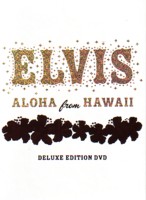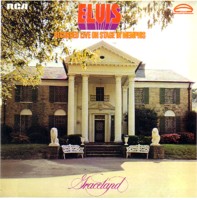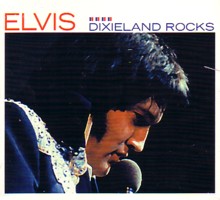Film
Biography: Elvis Aaron Presley
|
The
only rock star ever to enjoy prolonged success on the
silver screen, Elvis Presley was a phenomenon the likes
of whom will never be seen again. His impact remains
incalculable, and it could easily be argued that no
figure of the postwar era exerted a greater or more
far-reaching influence on popular culture as we know
it.
It
is fashionable to bash his 31 feature films, and indeed
they pale in comparison to Richard Lester's features
with the Beatles, to name just one example.
|
 |
However, the continuing importance of rock-and-roll in film
-- not only as a subject matter but also as an essential component
of soundtracks and scores -- seems inconceivable had Presley
not first made the music both commercially viable and culturally
palatable.
His
movies were made and marketed solely for his fans, and they
responded in droves. By extension, he created a youth market
which despite myriad generational changes remains essentially
the same decades later, and all other pop musicians turned
movie stars, from Prince to Madonna to the Spice Girls, follow
in his footsteps.
The
details of Presley's early years have passed into mythology:
born January 8, 1935 in Tupelo, Mississippi, he grew up in
abject poverty, later working as a truck driver for the Memphis-based
Crown Electric company. As a gift for his mother, he recorded
an acetate demo which brought him to the attention of Sun
Records owner Sam Phillips, who soon brought him back to the
studio to record with area musicians Scotty Moore and Bill
Black.
From
the release of his first single, "That's All Right, Mama," Presley was a juggernaut; he later moved to the RCA label
and there became a national phenomenon, widely credited with
popularizing the burgeoning rock 'n' roll movement.
Hollywood
was immediately interested, and his manager, the notorious
Colonel Tom Parker, signed contracts with the likes of 20th
Century-Fox, Paramount and MGM without Presley even appearing
before the camera. His pictures were tailored exclusively
to his needs, with bare-bones plots, exotic locales, beautiful
co-stars and numerous musical numbers.
The
first, 1956's Love Me Tender, was a Civil War-era western
that became one of the year's biggest hits and launched a
Number One single with its title track. Presley's next film,
1957's Jailhouse Rock, was one of his best, thanks to its
imaginative production numbers.
It
was followed by Loving You and then 1958's King Creole, a
rare attempt at a more substantial offering -- in this case,
an adaptation of the Harold Robbins novel A Stone for Danny
Fisher. When it was announced that Presley had been inducted
into the Army, many predicted career disaster, but he resurfaced
in 1960 bigger than ever with G.I. Blues.
By
now, he had stopped performing live to concentrate almost
solely on films; even the majority of his albums were soundtrack
recordings. Throughout the decade Presley made two or three
films annually, all essentially variations on the same formula;
in no less than three different films -- 1963's Viva Las Vegas,
1966's Spinout, and 1968's Speedway -- he even played a race
car driver.
In
1969, he attempted to change his image by playing a dramatic
role in Charro, but in the wake of the Summer of Love his
popularity as both a singer and an actor were on the wane.
He then played a doctor in A Change of Habit, but it was his
last film role.
In
the 1970s Presley returned to live performance, and his popularity
surged; however, years of drug abuse took their toll, and
he died August 16, 1977. He remains more popular today than
ever before.
(Source:
Jason Ankeny, All Movie Guide)
|







